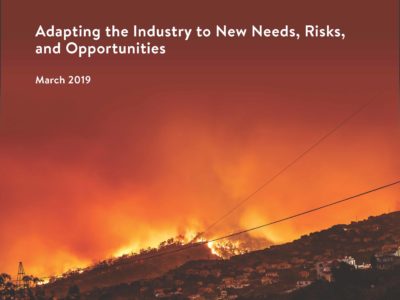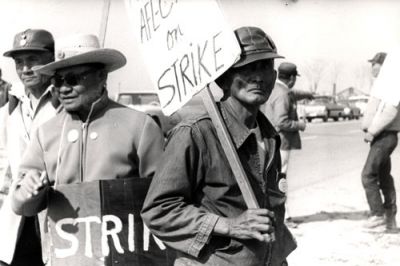Symposium Brief: Insuring California in a Changing Climate
New CLEE report highlights key climate-related risks and opportunities for insurance industry
Climate change poses risks to California’s economy, residents, infrastructure, cities, and natural resources. The insurance industry, which provides financial protection to governments, individuals, and businesses for risks they face, will play a central role in efforts to the harmful impacts of climate change on California. Yet the industry itself is vulnerable to a number of climate change-related risks that may affect its ability to maintain its historical level of protection throughout California.
Last year, Berkeley Law’s Center for Law, Energy & the Environment (CLEE) convened a symposium, including a keynote address by Insurance Commissioner Dave Jones (now Director of CLEE’s Climate Risk Initiative), that featured insight and analysis of the role insurance will play in a changing climate. CLEE is now releasing a symposium brief to present the key findings from the event along with top recommendations for industry and policy makers.
Download the symposium brief here.
The brief highlights key discussion points from expert panels on climate science and insurance modeling; legal liability and climate change litigation; vulnerability of insurers’ assets and financial markets; innovative insurance products and proactive investments; and insurance affordability and availability. Among the recommendations for state and industry leaders detailed in the symposium brief:
- Require insurers to employ increasingly detailed and comprehensive catastrophe models that accurately assess evolving wildfire and other risks while suggesting potential mitigation measures;
- Enhance disclosure of corporate and insurer risks due to climate change to increase transparency and decrease litigation risks;
- Develop carbon supply curves that map economic transition scenarios for specific market sectors;
- Offer innovative insurance products that can incentivize risk reduction, such as coverage upgrades for fire-hardened structures and discounts for green buildings; and
- Craft legislative reforms to ensure affordability and availability in all communities, like mandatory renewal offers for properties that meet mitigation and defensible-space requirements.
Many of the solutions discussed at the symposium (and in our comprehensive 2018 report Trial by Fire) have since been reflected in law, including measures like SB 824 (Lara, 2018, limiting blanket policy cancellations following a major disaster event) and SB 30 (Lara, 2018, convening a working group to support ecosystem restoration-based insurance initiatives). As California experiences more concrete and consistent impacts of climate change, continued discussion of these solutions will become ever more essential.
CLEE will host a free webinar today Wednesday, March 27, at 10 am to discuss the new symposium brief and officially welcome Dave Jones to CLEE. Please join us to hear his perspective on the issues covered in the brief as well as the broader role of the insurance and financial sectors in a changing climate.
Reader Comments
One Reply to “Symposium Brief: Insuring California in a Changing Climate”
Comments are closed.







It is worth noting that the “worst case scenario” is not the type of storms, etc. that we have been seeing. There is a small but non-zero chance that the worst case scenario is hitting a tipping point of some kind that would end (at least for us) in warming severe enough to boil the oceans. Yes, the possibility of worst case global warming is severe enough to be very concerned.
Welcome to Venus.